What The 1970s Oil Shock Can Tell Us About Today
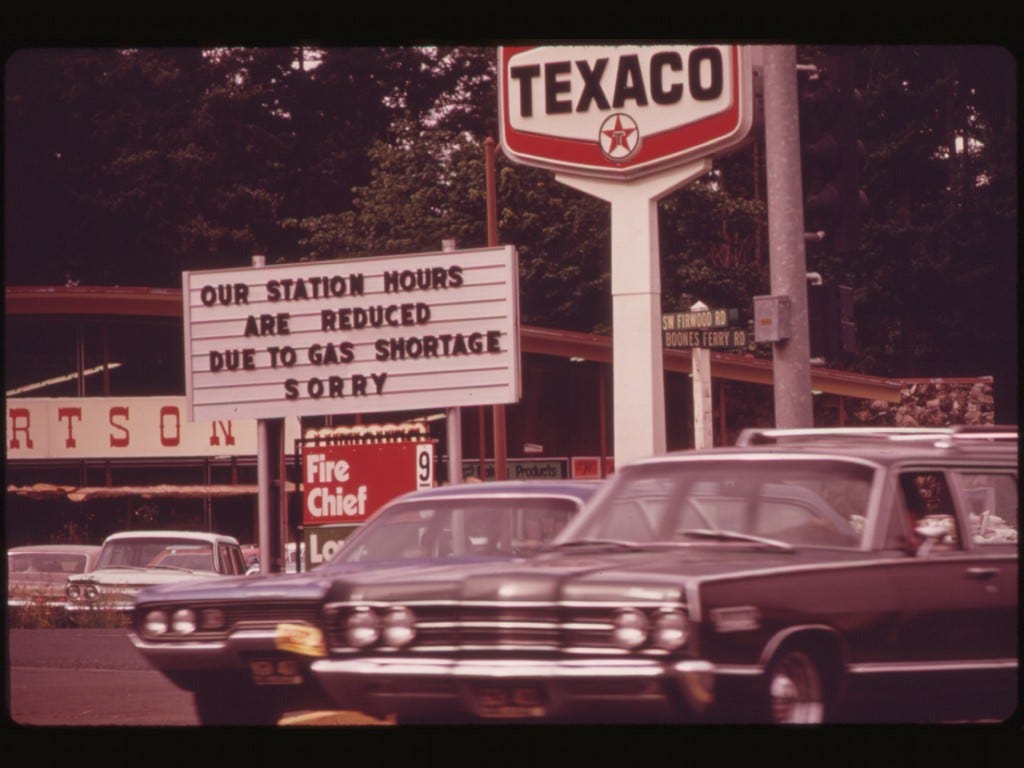
It feels a lot like the 1970s. Fuel prices are rising, the Third World is writhing, and Silk Sonic is vibing in bell bottoms again. War in Ukraine has blown up energy prices like the 1973 Israel War, with the West somehow sanctioning itself this time. As Miss Shirley Bassey said, “it’s just a little bit of history repeating.”
So let’s read some history (Oil Shock: The 1973 Crisis And Its Economic Legacy, edited by Elisabetta Bini, Giuliano Garavini, and Federico Romero).
The 1970s Oil Crisis
According to Fiona Venn, “the energy crisis of 1973 consisted of two ‘distinct but interrelated crises’, one ‘political’, the other ‘economic’.”
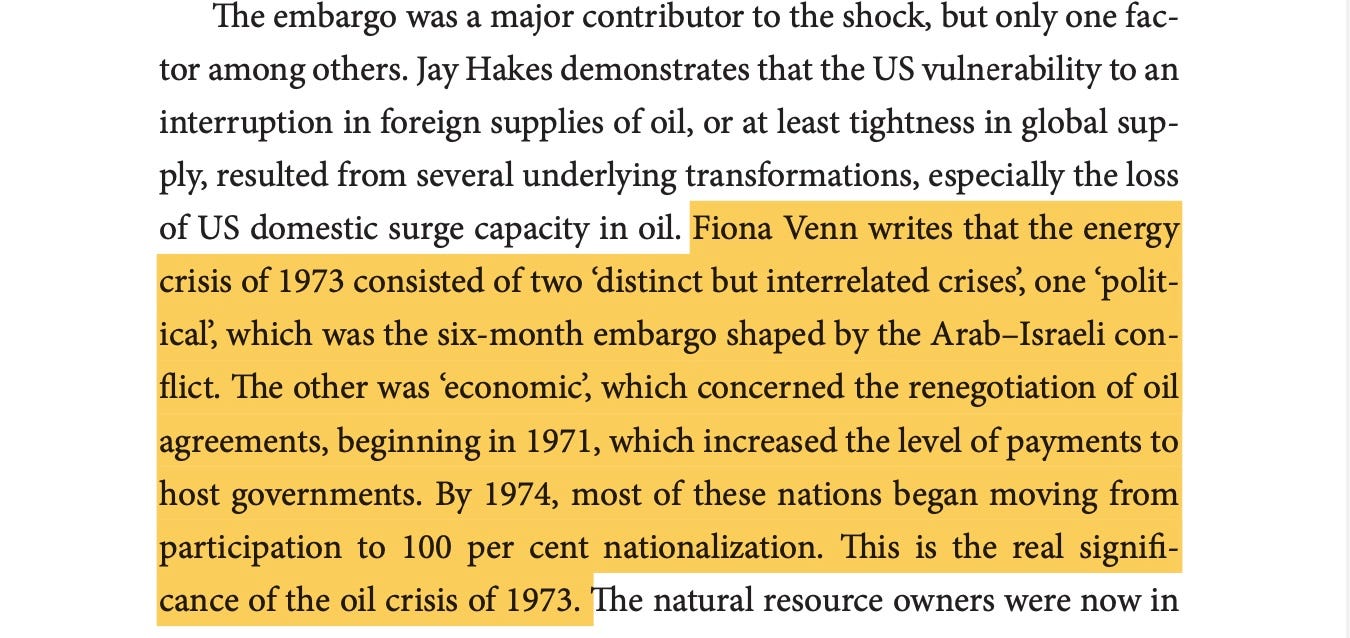
The political crisis was the oil embargo declared by Arab members of OPEC in 1973. But they were only even able to do this because oil-producing countries had already been nationalizing their natural resources for years.
As Christopher R.W. Dietrich wrote, “OPEC had waged a protracted and highly publicized campaign to wrest pricing and production control from the grip of the multinationals in the previous half-decade. Between September 1970 and September 1973, the nominal posted price had already moved from $1.80 to $3.07, its largest sustained increase in history.”
Hence the economic pressure was building before the political pressure exploded. As the soon-to-be deposed Iranian Shah said, “You’ve sent petrochemical prices rocketing. ‘You buy our crude and sell it back to us, refined as petrochemicals, at a hundred times the price you’ve paid us. You make us pay more, scandalously more, for everything, and it’s only fair that, from now on, you should pay more for oil.”
In many ways, what the West called an oil ‘crisis’ was a moment of proud decolonization. Newly independent governments from Iraq to Venezuela took sovereign control back of their natural resources. As the editors wrote, “For many oil-producing countries, on the other hand, the shock was associated with the end of colonialism and with full membership in the international economy, and in many cases it was not at all perceived as a crisis, let alone as a shock.”
For those countries it worked pretty well, but it fucked everybody else, especially other colonized people in the South. As William Glenn Gray wrote, “The oil states were taking in far more money than they could spend, even as the new price levels generated hardship for the industrial West and disaster for the world’s poorest states.”
As Glenn Gray continued,
Now OPEC members were likely to take in a surplus of $60 billion in 1974 alone, with $9 billion in deficits accrued by developing countries. Perhaps it was time to hammer home the irresponsibility of the oil producers, whose actions would cause so much misery for the world economy and for the poorest countries in particular?
We felt this in Sri Lanka in the 1970s as profound energy and food and shortages which were blamed on the socialist(ish) government of the time. But these were really global trends that destabilized governments the world over. Hence the ‘oil shock’. While oil-producing countries were able to get a fair share for themselves, it made the world more unfair overall. For reasons that will follow.
The Empire Strikes Back
By nationalizing oil resources and forming a cartel, oil-producing countries were able to earn much more money than before. So much money that they didn’t even know what to do with it. If this was a truly decolonizing moment that money should have flowed into other colonized countries, but that’s not what happened. We weren’t in the cartel.
Instead, while western countries lost some control of petroleum, they retained control of the petrodollar. Almost all of that money was ‘recycled’ up North. As Glenn Gray wrote, “put simply, the oil producers did not want to bear the risk of pouring their earnings directly into developing countries.” Instead, “when the oil exporters began to shift from short-term bank deposits to medium-term bond purchases, they favoured the industrial nations by a huge margin: France, Japan, the US and even (unwisely) Britain.”
In this way, the colonial hydra just regrew whatever heads had been lopped off by the defiance of 1973. Oil-producing countries were paid off, but the financial control of White Empire over the world remained intact, and even grew stronger.
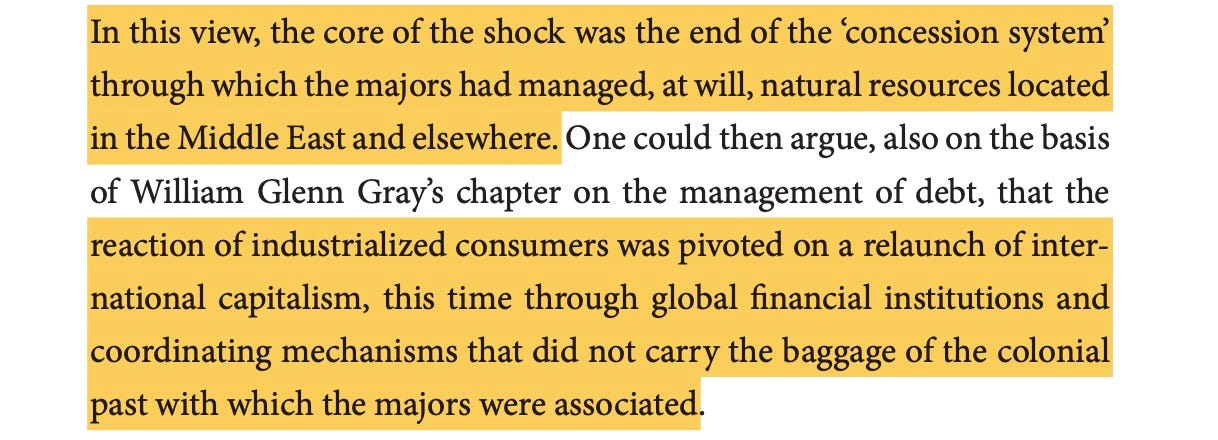
While oil-producing countries were running surpluses, most of the Global South fell into terrible western debt traps. As Glenn Gray wrote, “The losers here, as in any globalized system, were poor countries that had nothing substantial to exchange as the price of oil and food and industrial goods all shot upwards.”
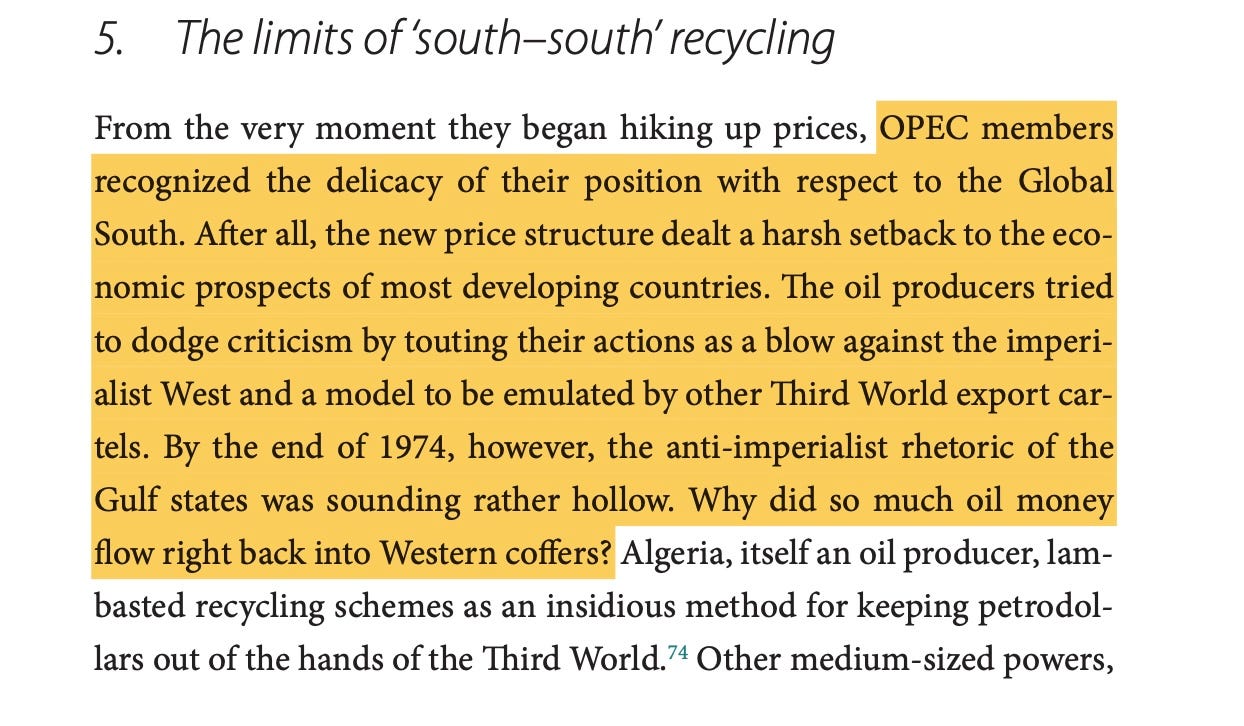
While the anti-imperial ‘model to be emulated’ was nationalizing resources, the exact opposite happened in the Global South. Countries driven into debt and destitution had to ‘open up’ to the predations of western capital even more, privatizing resources, cheapening their labor, and becoming trapped in western debt that most have yet to clamber out of.
While oil-producing countries staked a claim to their petroleum, the White Empire still retained control of the petrodollar, which was where the real power was. America used this to finance its own military and eventually occupy much of the Middle East with bases or outright invasion.
Of the original five OPEC members (Iran, Iraq, Kuwait, Saudi Arabia, and Venezuela), two are sanctioned, one has been invaded, and the others are occupied with American military bases. They get paid for their troubles, but they’re still paid in imperial coin. Hell, the headquarters of OPEC is in Austria now. The Empire struck back hard.
Fuck The Climate Forever
We knew about climate change in the 1970s and the Oil Shock was the prime moment to do something about it. Jimmy Carter put solar panels on the White House roof but when Reagan was elected he took them down. That pretty much tells you how policy went.
As Tyler Priest wrote, “The overriding lesson of the oil shock was indeed to ‘try something different’. To a significant extent, that meant trying different things, in different locations, but in pursuit of the same objective — hydrocarbons.”
The response to pressure from oil-producing countries could have been to use less oil, but no. The response was to produce more oil. The policy running all the way through Obama and Trump and Biden has been oil independence, not independence from oil.
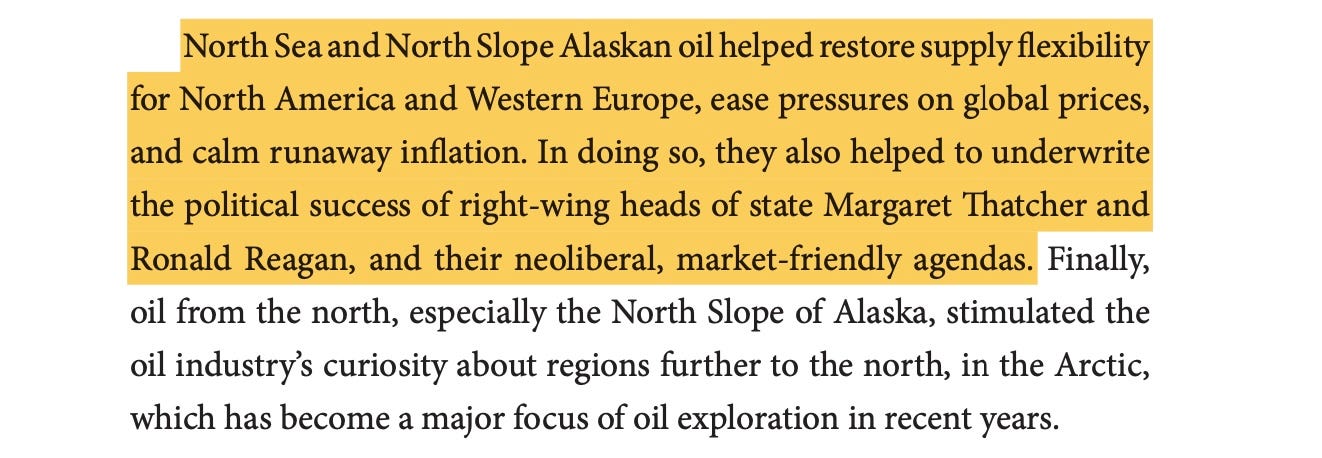
As Priest said,
“There is no gainsaying the immediate and huge impact that the shock of 1973 had on propelling oil companies into new territorial and technological frontiers. Today’s expanding supply of oil and gas from offshore and deepwater provinces, such as the deepwater ‘Golden Triangle’ of Gulf of Mexico–Brazil–West Africa, the growing interest in the hydrocarbon potential of the Arctic, and the dramatic shale plays that are emerging around the world can all trace their legacy back to the industry’s technological response to the shock of 1973.”
Which brings us to the fossil fuel shock of today. They say that those who forget history are doomed to repeat it. They should just say we’re doomed.
The 2020s Everything Shock
The reason I was reading about the 1970s was because my country, Sri Lanka, has gotten fucked in the same way. We have completely fallen into the western debt trap laid in the 1980s (as a response to the last crisis) and we find ourselves in an even worse crisis today. Petrodollars and fossil fuels have effectively run out here, we have kilometer-long queues for cooking gas and petrol/diesel. I have personally given up, I usually ride a bicycle or take a bus.
Sri Lanka’s debt crisis was decades coming, but the proximate shock of the Ukraine war is creating energy shock that’s going to decimate Europe and the UK this winter. This is a really weird replay of the 1970s, when Arab producers cut off the West in reaction to war in Israel. This time America is cutting Europe off, by imposing completely unworkable sanctions that Europe has to pay for. History really is repeating as farce.
The world again has another painful lesson that maybe we should switch to renewables that any country can produce, but no, we’re just failing climate class again. Europe is burning more coal to plug the cap, America is proudly opening up more drilling, and everybody is just hitting the climate crack harder rather than going to rehab.
Just as in the 1970s, Russia directly and China and India indirectly are asserting energy independence as a proxy for economic independence. Russia is straight-up saying ‘fuck you’ to NATO (an offensive white supremacist organization at this point) while China and India are refusing to fuck themselves because America says so. Ukrainian people somehow get clobbered in the middle of this, along with a bunch of bystanders in the Third World. So you know, Cold War again, which was always plenty hot down here.
The only part that’s missing is the empire striking back. And that’s the part that I think isn’t going to happen. White Empire, headed by America, is simply in a much, much weaker position now. They have deindustrialized, have huge levels of personal and national debt, and have abused their reserve currency status so much that no one trusts it anymore. China and Russia and India are not small, unindustrialized countries like OPEC was at the time. They have not only natural resources but also means of production, and connections with each other and the world.
The truth is that these countries weren’t actively trying to exit the petrodollar, but the idiot Americans are forcing them to. So India is buying oil in rubles now and reselling it to the patsy Europeans, Saudi Arabia is selling oil to China in Yuan, and poor indebted countries are crashing out of the dollar system entirely.
Whereas in the 1970s, White Empire lost control of petrol but retained control of the money, this time it looks like it’s losing it all. And it’s actually irrelevant who claims control of the planet now. The planet itself is out of control.
The oil shock of the 1970s should have driven a wholesale shift away from fossil fuels and imperial capitalism, but instead they just rebuilt the fucking Death Star, pointed it at Earth, and pulled the trigger. It’s already happened. Climate collapse is not in the future anymore, it’s now. The fact is that fossil fuels were never sustainable in the long run, and now the long run has come.
Pandemics, famines, heat waves, floods, conflict, it’s already begun. Over the next few decades, we are talking mass extinction, mass conflict, and the end of the world as we know it. In the 1970s they were able to just pump more poison and hit the snooze button on history, but it’s 50 years later now. We’re squabbling over fossil fuels again, Empire is trying to assert the old imperial order, but economics and politics will be beggared by biology and physics soon enough. We’re really just fighting over cigarettes at our own execution.
Miss Shirley Bassey said it was just a little bit of history repeating, but we can’t get away this time. If you repeat mistakes often enough, you eventually pay the price. We’ve been told once, we won’t be told twice. If you keep lighting fires where you live, you end up burning down the house.